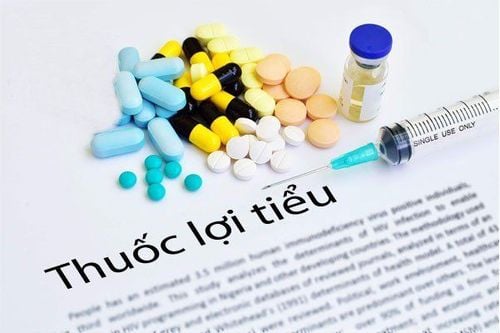This is an automatically translated article.
Renitec is an ACE inhibitor, whose main ingredient is Enalapril. The drug is used in the treatment of hypertension. The following article provides you with information about the uses and some notes when using Renitec.
1. What is Renitec?
What is Renitec? Renitec is a drug indicated for the treatment of high blood pressure, containing the main ingredient is Enalapril maleate with a strength of 5mg. Enalapril maleate is the maleate salt of Enalapril, a derivative of two amino acids, L - alanine and L - proline. Following oral administration, enalapril is absorbed and hydrolysed to Enalaprilat, a long-acting and highly specific non-sulphydryl angiotensin-converting enzyme (ACE) inhibitor.
2. What are the effects of Renitec?
2.1.Indications Renitec is indicated in the following cases:
Treatment of hypertension. Heart failure (reduced mortality and complications in patients with symptomatic heart failure and asymptomatic left ventricular dysfunction). After myocardial infarction (hemodynamically stable). Diabetic nephropathy (with or without hypertension). Chronic renal failure. 2.2.Contraindications Contraindicated to use Renitec drug in the following cases:
Allergy or hypersensitivity to Enalapril maleate or any excipients of Renitec drug. History of hereditary or idiopathic angioedema. Bilateral renal artery stenosis. Renal artery stenosis in a patient with one kidney. Aortic valve stenosis. Severe obstructive cardiomyopathy. Not to be used concurrently with Aliskiren in patients with diabetes mellitus. Not to be used concurrently with Neprilysin (sacubitril).
3. How to take Renitec
3.1 Dosage Renitec is to be taken orally. The absorption of Renitec is not affected by food, the time of taking the drug is not related to meals. So you can use the drug at any time.
Hypertension
Starting dose depends on the degree of hypertension: usually 5mg/day x 1 time/day. Maintenance dose is usually determined after 2-4 weeks of treatment depending on the clinical response of the patient. The usual maintenance dose is 10-40 mg/day, administered once a day or in two divided doses. Maximum dose 40mg/day. It is recommended that patients start at a low dose, because of the risk of symptomatic hypotension. Diuretic therapy should be discontinued approximately 2 to 3 days prior to initiating treatment with Renitec.
Dosage for patients with renal failure
Dosage of Renitec is adjusted depending on the degree of renal failure and the patient's response to treatment:
Creatinine clearance 30-80ml/min: dose 5-10mg/day . Adjust dose up to a maximum dose of 40 mg/day. Creatinine clearance 10-30ml/min: dose 2.5-5mg/day. Adjust dose until blood pressure is controlled. Dosage for patients with heart failure
Enalapril is often combined with digitalis and diuretics (the dose of diuretics should be reduced, given at intervals before using Enalapril). The initial dose is 2.5 mg/day, the therapeutic dose can be gradually increased to a maximum dose of 40 mg/day. Monitor carefully during dose escalation. Dosage can be divided into 1 to 2 times per day.
3.2 Renitec Overdose and Management There is limited data on the use of Enalapril in humans. The prominent symptom of an overdose of Enalapril is severe hypotension. In case symptoms of Enalapril overdose appear, the patient should stop taking the drug and monitor the patient closely. In addition, application of symptomatic and supportive treatment measures such as induction of vomiting, gastric lavage, intravenous infusion of plasma and 0.9% NaCl solution helps maintain blood pressure and treat imbalances. electrolyte. Enalapril can be removed from the circulation by hemodialysis.
4. Undesirable effects when using Renitec thuốc
Adverse effects when using Renitec are usually mild and transient, but about 3% to 6% of people taking the drug have to stop treatment. Severe symptomatic hypotension has been reported after the first dose of the drug and up to 2-3% of people in clinical trials discontinued treatment, especially in patients with hyponatremia, heart failure, Elderly patients on concurrent diuretic therapy.
Patients with congestive heart failure often present with worsening renal function, increased serum potassium levels, and symptomatic hypotension, especially during the initial period of Enalapril in patients receiving concomitant diuretics. Deterioration of renal function has occurred in approximately 20% of hypertensive patients with renal disease, particularly in patients with bilateral renal artery stenosis or renal artery stenosis in patients with one kidney.
When using Renitec, you may experience some of the following undesirable effects:
Nervousness: headache, dizziness, fatigue, insomnia. Body as a whole: syncope, rash, dry cough. Cardiovascular: cerebrovascular accident, angioedema, chest pain, palpitations, severe hypotension, orthostatic hypotension. Gastrointestinal: diarrhea, nausea, vomiting, taste disturbances, abdominal pain. Rare: pancreatitis, liver failure, toxic hepatitis, cholestasis, intestinal obstruction. Blood: agranulocytosis, decreased hemoglobin and hematocrit. If you experience any unwanted effects while taking Renitec, notify your doctor for timely treatment.
5. Some notes when using Renitec
Use Renitec with caution in patients with severe renal impairment, liver failure, gout. Patients with suspected renal artery stenosis should have their serum creatinine measured before using Renitec. Symptomatic hypotension has rarely occurred in uncomplicated hypertensive patients. In patients with hypertension while taking Renitec, volume depletion is more likely to have symptomatic hypotension. Enalapril should be used with caution in patients with left ventricular outflow tract obstruction. Angioedema of the face, lips, tongue, glottis or larynx, extremities has rarely been reported in patients receiving ACE inhibitors including Renitec. If the patient develops angioedema, it is necessary to stop using Renitec immediately and monitor for timely management. The risk of angioedema was increased in patients with a history of airway surgery, black skin, a history of angioedema unrelated to ACE inhibitor therapy, and concomitant use of mTOR inhibitors. Concomitant use of Renitec and potassium supplements, potassium-sparing diuretics, salt substitutes containing potassium or other drugs may increase serum potassium, especially in patients with impaired renal function. Pregnancy: Enalapril can cross the placenta, causing illness and death to the fetus and newborn when the pregnant mother uses the drug. Use of Renitec during the 2nd and 3rd trimesters of pregnancy can cause diseases leading to stillbirth, damage to the newborn including: hypotension, renal failure with or without recovery, neonatal cranial hypoplasia and even dead. Enalapril should be discontinued as soon as possible when pregnancy is detected. Neonates whose mothers have used Renitec during pregnancy should be closely monitored for oliguria, hypotension, and hyperkalemia. Lactation: Enalapril may be excreted in human milk. However, when used at usual therapeutic doses, the risk of adverse effects in the nursing infant is very low. Therefore, a decision must be made between not taking the drug or stopping breastfeeding, depending on how necessary Renitec is for the mother.
6. Drug interactions
Certain other vasodilators (eg, nitrates) or anesthetics when used concurrently with Enalapril can cause severe hypotension. The patient should be closely monitored and corrected by volume expansion (infusion). Diuretics: Concomitant administration of Renitec may cause excessive hypotension after initiation of therapy. It is best to discontinue diuretics before starting treatment with Renitec. Renin-releasing antihypertensive agents (diuretics): The antihypertensive effect of Enalapril is enhanced, because renin-releasing drugs have antihypertensive effects. Drugs that increase blood potassium (such as potassium-sparing diuretics, potassium supplements, or salts containing potassium) may cause hyperkalemia, especially in patients with renal failure. Monitor patients closely and regularly check blood potassium levels. Lithium: may increase blood lithium levels leading to lithium toxicity when used concomitantly with Enalapril. Non-steroidal anti-inflammatory drugs: Concomitant use may reduce the antihypertensive effect of Renitec. Oral contraceptives: increase the risk of vascular damage and difficult to control blood pressure when used with Renitec. Enalapril may decrease fasting blood glucose levels in patients without diabetes and lower blood glucose in patients with diabetes controlled by oral antidiabetic agents or insulin. Renitec is an ACE inhibitor, the main ingredient of which is Enalapril. The drug is used in the treatment of hypertension. To ensure the effectiveness of treatment and avoid unwanted side effects, patients need to strictly follow the instructions of the doctor, professional pharmacist.
Follow Vinmec International General Hospital website to get more health, nutrition and beauty information to protect the health of yourself and your loved ones in your family.
Please dial HOTLINE for more information or register for an appointment HERE. Download MyVinmec app to make appointments faster and to manage your bookings easily.













